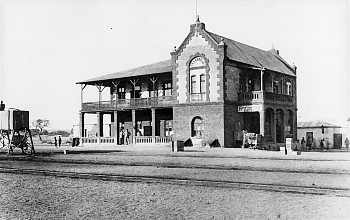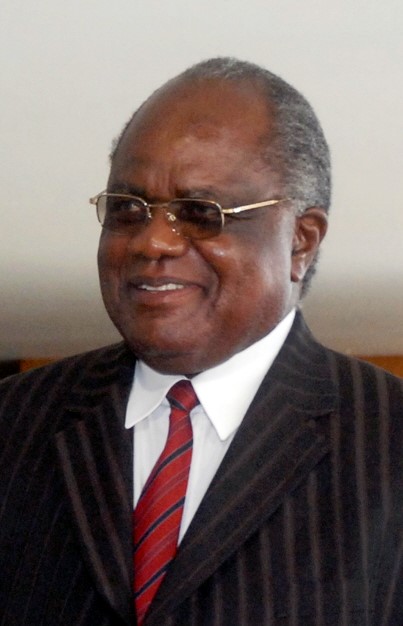|
Piet Van Der Walt
Piet Jacobus van der Walt (born 14 January 1966 in Okahandja) is a Namibian businessperson and politician who has been the Deputy Minister of National Planning since 2018. Early life and education Van der Walt grew up in Okahandja and went to primary school there. His secondary school was the Higher Technical School in Windhoek. He became a diesel mechanic by profession, graduating in 1989 from the Windhoek Technical College. He also holds an engineering diploma in mechanical drawing and machines and properties of metals. Commenting on his alleged service for ''Koevoet'', the counter-insurgency branch of the South West African Police (SWAPOL) before Namibian independence, he stated that his short stint in Oshakati in the north of Namibia was merely to serve in the auxiliary service as mechanic. From 1990 he worked for Old Mutual in Windhoek. In 1999 he started ''Van der Walt Motors'', a service station with surrounding shops near Windhoek's city centre. Political career A W ... [...More Info...] [...Related Items...] OR: [Wikipedia] [Google] [Baidu] |
Okahandja
Okahandja is a city of 24,100 inhabitants in Otjozondjupa Region, central Namibia, and the district capital of the Okahandja electoral constituency. It is known as the ''Garden Town of Namibia''. It is located 70 km north of Windhoek on the B1 road. It was founded around 1800, by two local groups, the Herero and the Nama. History Okahandja means ''the place where two rivers'' (Okakango and Okamita) ''flow into each other to form one wide one'' in Otjiherero. A German pastor, Heinrich Schmelen, became the first European to visit the town in 1827. In 1844, two missionaries were permanently assigned to the town, Heinrich Kleinschmidt and Hugo Hahn. A church dates from this period. A military post was established at the initiative of Theodor Leutwein in 1894, and it is this date that is officially recognized as the town's founding.Okahandja Hist ... [...More Info...] [...Related Items...] OR: [Wikipedia] [Google] [Baidu] |
2009 Namibian General Election
General elections were held in Namibia on 27–28 November 2009. They were the fourth general elections since independence and the fifth democratic elections. Voting ended on 28 November and official election results, released on 4 December, showed that Hifikepunye Pohamba and his SWAPO Party were re-elected, each with over 75% of the vote. Prior to the election, the South West Africa People's Organization (SWAPO) was widely expected to score a landslide victory, with the Rally for Democracy and Progress (RDP) considered SWAPO's biggest challenger. Fourteen political parties competed for seats in the National Assembly of Namibia, and twelve candidates ran for the Presidency.Large Victory Likely for Namibia Governing Party New York Times, 28 November 2009 Parties |
Members Of The National Assembly (Namibia)
Member may refer to: * Military jury, referred to as "Members" in military jargon * Element (mathematics), an object that belongs to a mathematical set * In object-oriented programming, a member of a class ** Field (computer science), entries in a database ** Member variable, a variable that is associated with a specific object * Limb (anatomy), an appendage of the human or animal body ** Euphemism for penis * Structural component of a truss, connected by nodes * User (computing), a person making use of a computing service, especially on the Internet * Member (geology), a component of a geological formation * Member of parliament * The Members, a British punk rock band * Meronymy, a semantic relationship in linguistics * Church membership, belonging to a local Christian congregation, a Christian denomination and the universal Church * Member, a participant in a club or learned society A learned society (; also learned academy, scholarly society, or academic association) is ... [...More Info...] [...Related Items...] OR: [Wikipedia] [Google] [Baidu] |
Namibian Expatriates In South Africa
Namibia (, ), officially the Republic of Namibia, is a country in Southern Africa. Its western border is the Atlantic Ocean. It shares land borders with Zambia and Angola to the north, Botswana to the east and South Africa to the south and east. Although it does not border Zimbabwe, less than 200 metres (660 feet) of the Botswanan right bank of the Zambezi River separates the two countries. Namibia gained independence from South Africa on 21 March 1990, following the Namibian War of Independence. Its capital and largest city is Windhoek. Namibia is a member state of the United Nations (UN), the Southern African Development Community (SADC), the African Union (AU) and the Commonwealth of Nations. The driest country in sub-Saharan Africa, Namibia has been inhabited since pre-historic times by the San, Damara and Nama people. Around the 14th century, immigrating Bantu peoples arrived as part of the Bantu expansion. Since then, the Bantu groups, the largest being ... [...More Info...] [...Related Items...] OR: [Wikipedia] [Google] [Baidu] |
Afrikaner People
Afrikaners () are a South African ethnic group descended from predominantly Dutch settlers first arriving at the Cape of Good Hope in the 17th and 18th centuries.Entry: Cape Colony. ''Encyclopædia Britannica Volume 4 Part 2: Brain to Casting''. Encyclopædia Britannica, Inc. 1933. James Louis Garvin, editor. They traditionally dominated South Africa's politics and commercial agricultural sector prior to 1994. Afrikaans, South Africa's third most widely spoken home language, evolved as the mother tongue of Afrikaners and most Cape Coloureds. It originated from the Dutch vernacular of South Holland, incorporating words brought from the Dutch East Indies (now Indonesia) and Madagascar by slaves. Afrikaners make up approximately 5.2% of the total South African population, based upon the number of White South Africans who speak Afrikaans as a first language in the South African National Census of 2011. The arrival of Portuguese explorer Vasco da Gama at Calicut, India, in ... [...More Info...] [...Related Items...] OR: [Wikipedia] [Google] [Baidu] |
White Namibian People
White is the lightest color and is achromatic (having no hue). It is the color of objects such as snow, chalk, and milk, and is the opposite of black. White objects fully reflect and scatter all the visible wavelengths of light. White on television and computer screens is created by a mixture of red, blue, and green light. The color white can be given with white pigments, especially titanium dioxide. In ancient Egypt and ancient Rome, priestesses wore white as a symbol of purity, and Romans wore white togas as symbols of citizenship. In the Middle Ages and Renaissance a white unicorn symbolized chastity, and a white lamb sacrifice and purity. It was the royal color of the kings of France, and of the monarchist movement that opposed the Bolsheviks during the Russian Civil War (1917–1922). Greek and Roman temples were faced with white marble, and beginning in the 18th century, with the advent of neoclassical architecture, white became the most common color of new churc ... [...More Info...] [...Related Items...] OR: [Wikipedia] [Google] [Baidu] |
Namibian Farmers
Namibia (, ), officially the Republic of Namibia, is a country in Southern Africa. Its western border is the Atlantic Ocean. It shares land borders with Zambia and Angola to the north, Botswana to the east and South Africa to the south and east. Although it does not border Zimbabwe, less than 200 metres (660 feet) of the Botswanan right bank of the Zambezi River separates the two countries. Namibia gained independence from South Africa on 21 March 1990, following the Namibian War of Independence. Its capital and largest city is Windhoek. Namibia is a member state of the United Nations (UN), the Southern African Development Community (SADC), the African Union (AU) and the Commonwealth of Nations. The driest country in sub-Saharan Africa, Namibia has been inhabited since pre-historic times by the San, Damara and Nama people. Around the 14th century, immigrating Bantu peoples arrived as part of the Bantu expansion. Since then, the Bantu groups, the largest being the Ovambo, ha ... [...More Info...] [...Related Items...] OR: [Wikipedia] [Google] [Baidu] |
Living People
Related categories * :Year of birth missing (living people) / :Year of birth unknown * :Date of birth missing (living people) / :Date of birth unknown * :Place of birth missing (living people) / :Place of birth unknown * :Year of death missing / :Year of death unknown * :Date of death missing / :Date of death unknown * :Place of death missing / :Place of death unknown * :Missing middle or first names See also * :Dead people * :Template:L, which generates this category or death years, and birth year and sort keys. : {{DEFAULTSORT:Living people 21st-century people People by status ... [...More Info...] [...Related Items...] OR: [Wikipedia] [Google] [Baidu] |
1966 Births
Events January * January 1 – In a coup, Colonel Jean-Bédel Bokassa takes over as military ruler of the Central African Republic, ousting President David Dacko. * January 3 – 1966 Upper Voltan coup d'état: President Maurice Yaméogo is deposed by a military coup in the Republic of Upper Volta (modern-day Burkina Faso). * January 10 ** Pakistani–Indian peace negotiations end successfully with the signing of the Tashkent Declaration, a day before the sudden death of Indian prime minister Lal Bahadur Shastri. ** The House of Representatives of the US state of Georgia refuses to allow African-American representative Julian Bond to take his seat, because of his anti-war stance. ** A Commonwealth Prime Ministers' Conference convenes in Lagos, Nigeria, primarily to discuss Rhodesia. * January 12 – United States President Lyndon Johnson states that the United States should stay in South Vietnam until Communist aggression there is ended. * January 15 – 1966 N ... [...More Info...] [...Related Items...] OR: [Wikipedia] [Google] [Baidu] |
Namibia Economist
The ''Namibia Economist'' is a Namibian newspaper published digitally that focuses on local business and financial topics. It is published exclusively in English, Daniel Steinmann is the editor. First published in 1991 it appeared as a printed monthly newspaper. ''Namibia Economist'' published its last printed edition on 25 November 2016. The web site was established in 2001 and continues. References {{reflist External links Official web site Online publishing English-language newspapers published in Namibia Weekly newspapers published in Namibia Newspapers established in 1996 1996 establishments in Namibia Finance & Investment articles by quality ... [...More Info...] [...Related Items...] OR: [Wikipedia] [Google] [Baidu] |



